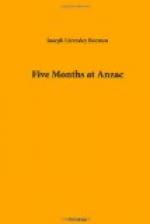At daylight a barge was towed out and, after placing all our equipment on board, we started for the beach. As soon as the barge grounded, we jumped out into the water (which was about waist deep) and got to dry land. Colonel Manders, the A.D.M.S. of our Division, was there, and directed us up a gully where we were to stay in reserve for the time being, meantime to take lightly-wounded cases. One tent was pitched and dug-outs made for both men and patients, the Turks supplying shrapnel pretty freely. Our position happened to be in rear of a mountain battery, whose guns the Turks appeared very anxious to silence, and any shells the battery did not want came over to us. As soon as we were settled down I had time to look round. Down on the beach the 1st Casualty Clearing Station (under Lieutenant-Colonel Giblin) and the Ambulance of the Royal Marine Light Infantry were at work. There were scores of casualties awaiting treatment, some of them horribly knocked about. It was my first experience of such a number of cases. In civil practice, if an accident took place in which three or four men were injured, the occurrence would be deemed out of the ordinary: but here there were almost as many hundreds, and all the flower of Australia. It made one feel really that, in the words of General Sherman, “War is hell,” and it seemed damnable that it should be in the power of one man, even if be he the German Emperor, to decree that all these men should be mutilated or killed. The great majority were just coming into manhood with all their life before them. The stoicism and fortitude with which they bore their pain was truly remarkable. Every one of them was cheery and optimistic; there was not a murmur; the only requests were for a cigarette or a drink of water. One felt very proud of these Australians, each waiting his turn to be dressed without complaining. It really quite unnerved me for a time. However, it was no time to allow the sentimental side of one’s nature to come uppermost.
I watched the pinnaces towing the barges in. Each pinnace belonged to a warship and was in charge of a midshipman—dubbed by his shipmates a “snotty.” This name originates from the days of Trafalgar. The little chaps appear to have suffered from chronic colds in the head, with the usual accompaniment of a copious flow from the nasal organs. Before addressing an officer the boys would clean their faces by drawing the sleeve of their jacket across the nose; and, I understand that this practice so incensed Lord Nelson that he




